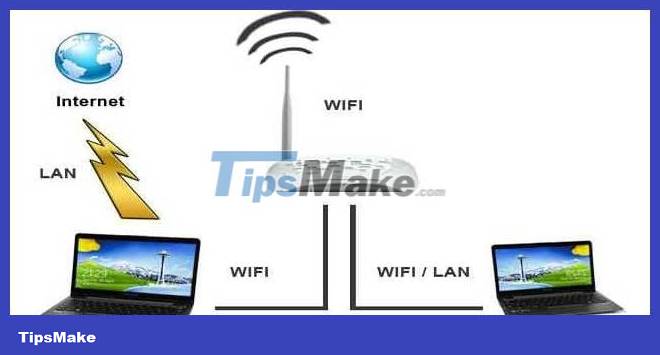Difference between WiFi and Internet
People often use the terms 'WiFi' and 'Internet' interchangeably. And you may be surprised to learn these two terms actually mean two different things.
There are a few reasons why you should know the difference between WiFi and Internet, and why it's important.
What is the Internet?
The Internet - a collaborative invention between Bob Kahn and Vint Cerf - is an invisible cloud made up of all the content that exists on the World Wide Web. We call this wide area network, abbreviated as WAN. Internet content includes social media, Google, text messages, even all those selfies you hope no one sees.

You can connect to the Internet with various devices - smartphones, computers, routers, smart watches, security cameras, etc. - to access existing content as well as add new content to it. Internet.
What is WiFi?
WiFi is a local area network (LAN). The term was named by the WiFi Alliance to refer to wireless networks that allow devices to access and connect to the wider Internet.

Although many people often believe that WiFi stands for Wireless Fidelity, this is actually not true. It's just a fun term inspired by the word 'Wireless'.
What's the difference between WiFi and Internet?
The Internet is a huge invisible entity, and Wi-Fi is the vehicle that takes you there. The Internet spans the globe - it includes every device, file and person connected in any way, wired or wireless. WiFi is more local - you can use your home WiFi network or connect to a WiFi network in a local area, such as hotels, restaurants or other public places.
As such, you really only have control over the WiFi. Likewise, you may or may not be connected to the Internet, but you cannot change or manipulate the Internet. In other words, you can set a password, control usage, range, and access point for the WiFi network. You can even upgrade your router for better connectivity. While you can upgrade your Internet speed and connection type, it's only an option on your end and it's up to your internet service provider (ISP) to adjust accordingly.
Here's a metaphor to help readers understand all this tech jargon: Imagine web traffic as getting from point A to point B in the real world. The Internet is the world, where there are all the destinations you can choose from. WiFi is a means of transportation, the way we get from our initial location to our final destination.

Why is it important to know the difference between WiFi and Internet?
Sure, you might still use these terms interchangeably in casual conversation, but there are cases where it's useful to know the difference between WiFi and Internet.
For example, when setting up a new network in a new home, you need to register for the Internet before you can set up your WiFi network. You should also know this difference when buying devices, like routers and modems. Basically, the ISP sets up the Internet and the router sets up the WiFi.
Knowing the difference between WiFi and Internet is also helpful when determining Internet speed. If you need a fast connection, you will need to sign up for the appropriate bandwidth with your ISP, as well as buy a router that can handle high-speed networks.
When your Internet connection is slow, you can self-diagnose and check whether your WiFi connection or cable Internet connection is slow. Taking a few minutes to troubleshoot the problem yourself can save you a lot of frustration and save you a lot of time contacting support.